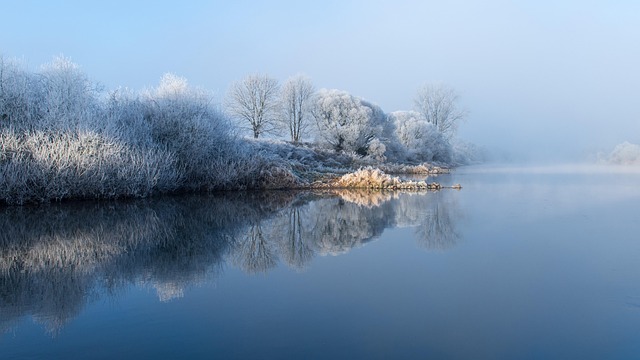Cold therapy, including cold plunges and water immersion in icy water, has gained popularity as a holistic approach to enhancing mental well-being. Scientific research shows that this practice stimulates endorphins, reduces pain, activates the vagus nerve, and improves emotional regulation, leading to stress and anxiety relief. Regular cold exposure can effectively manage mental health conditions like stress and anxiety, making it a potent tool with physical and psychological benefits. Always consult a medical professional before starting any new wellness regimen.
“Unleash the power of the cold for a holistic approach to mental well-being. This article delves into the science behind cold therapy, exploring its potential as a natural remedy for stress and anxiety. From understanding the concept of cold plunges to uncovering their profound impact on mental health, we navigate the calming effects of cold water immersion. Learn practical tips for incorporating cold exposure into your routine and discover how this ancient practice can revolutionize your stress relief and anxiety reduction journey.”
Understanding Cold Therapy: Unlocking the Potential for Mental Well-being
Cold therapy, also known as cryotherapy or cold water immersion, has gained significant attention in recent years for its potential to enhance mental well-being. This ancient practice involves exposure to cold temperatures, often through a cold plunge or dip in icy water, for a short period. The concept may seem unconventional, but the scientific community is uncovering compelling evidence supporting its benefits for managing stress and anxiety.
When you subject your body to cold exposure, it triggers a cascade of physiological responses. One key effect is the release of endorphins, often referred to as “feel-good” hormones, which can reduce feelings of pain and promote relaxation. Additionally, cold therapy stimulates the vagus nerve, playing a crucial role in regulating emotions and promoting calmness. This simple yet powerful technique has shown promise in studies, indicating that regular cold plunges could be an effective tool for stress relief and anxiety reduction. The calming effects extend beyond the initial immersion, as the body’s response to cold can lead to improved mental resilience and a heightened sense of tranquility over time.
The Science Behind Cold Plunges and Their Impact on Stress and Anxiety
The science behind cold plunges and their impact on stress and anxiety is fascinating. Cold water therapy, such as immersing oneself in cold water or taking a cold plunge, has been shown to have numerous mental health benefits. When you expose your body to cold water, it triggers a range of physiological responses. One key effect is the release of norepinephrine, a neurotransmitter that helps regulate stress and anxiety levels. Additionally, cold exposure stimulates the vagus nerve, which plays a crucial role in the body’s natural relaxation response.
The calming effects of cold plunges extend beyond these neurological benefits. Cold water immersion can also increase the production of endorphins, often referred to as “feel-good” hormones, which contribute to improved mood and reduced stress. Moreover, the shock of cold water helps to constrict blood vessels, which can slow down the heart rate and promote a sense of calm. These physiological changes create a powerful synergy, making cold plunges an effective tool for managing stress and anxiety in today’s fast-paced world.
Benefits of Cold Water Immersion: A Holistic Approach to Relaxation
Cold water immersion, such as a cold plunge or ice bath, has gained popularity as a holistic approach to stress and anxiety relief. The practice involves submerging oneself in cold water, typically below 59°F (15°C), for a brief period, often just a few minutes. This sudden exposure triggers a cascade of physiological responses that can have profound effects on mental well-being.
The calming effects of cold plunges are multifaceted. Acutely, the cold temperature activates the body’s parasympathetic nervous system, promoting relaxation and counteracting the sympathetic response associated with stress and anxiety. Chronically, regular cold water therapy may help reduce overall stress levels by balancing hormones related to stress response, such as cortisol. Additionally, cold exposure for anxiety reduction can enhance blood flow and oxygen delivery to muscles, contributing to a sense of rejuvenated calm. The unique combination of physical and psychological benefits makes cold water therapy an intriguing alternative or complement to traditional mental health practices.
Incorporating Cold Exposure into Your Routine: Tips and Best Practices
Incorporating cold exposure into your routine is a simple yet powerful way to enhance mental well-being. A cold plunge or water therapy session can be as short as a few minutes in an ice bath or a longer, more immersive experience in a cold lake or sea. The key is consistency; regular cold exposure can help your body and mind adapt to lower temperatures, leading to increased resilience and reduced stress responses. For best results, aim for 10-15 minute sessions, gradually decreasing the water temperature over time as your tolerance builds.
To maximize the calming effects of cold plunges, practice mindfulness during these immersions. Focus on your breath, allowing it to slow and deepen as you relax into the cold. Engage all your senses—the crispness of the water, its temperature, and any surrounding sounds or textures. After emerging from a cold plunge, dress warmly and spend time in quiet reflection, helping to consolidate the stress-reducing benefits. Always listen to your body and seek medical advice if you have any underlying health conditions before incorporating cold therapy into your routine.
Cold therapy, with its simple yet powerful approach, offers a natural and effective way to enhance mental well-being. By embracing the science behind cold plunges and incorporating them into daily routines, individuals can experience significant stress and anxiety reduction while fostering a holistic sense of relaxation. The calming effects of cold water immersion are undeniable, making it an accessible game-changer for those seeking improved mental health.
